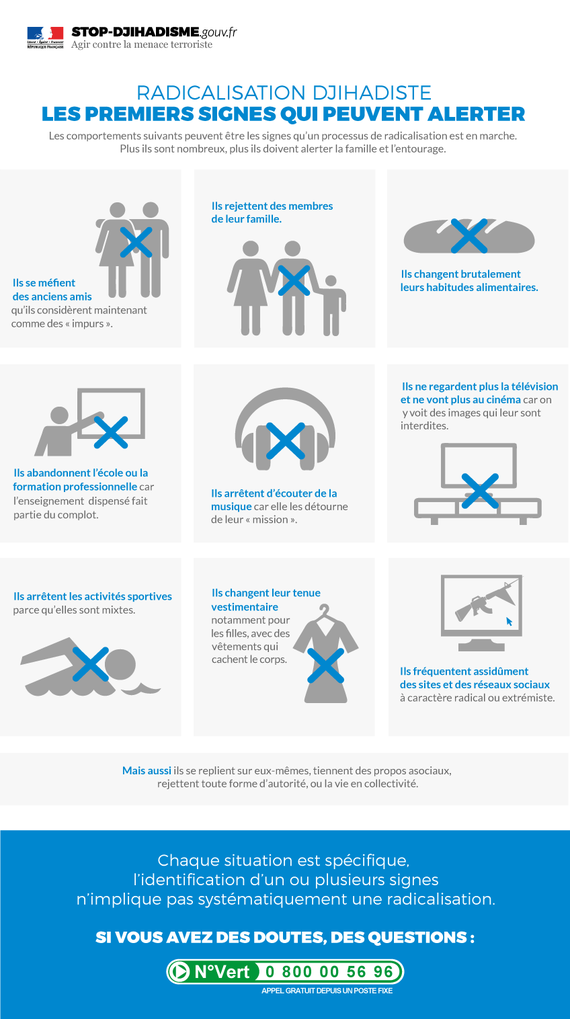
Courtesy of France
France Publishes 'How To Spot a Jihadist' Citizen's Guide
The French government releases new anti-jihadist literature Wednesday as part of a broader counterterrorism response to the Paris attacks.
How do you spot a radical jihadist? According to the French government, several signs should alert people that “a process of radicalization is underway.” “They” (meaning radicalized individuals):
mistrust old friends, whom they now consider ‘impure’… abruptly change their eating habits … no longer watch television or go to the movies because [these may show] images that are forbidden to them … change their attire, especially women, with clothes that conceal the body … [and] stop listening to music because it distracts them from their ‘mission.’

These individuals, the French government states in new anti-jihadist literature published Wednesday, also “withdraw into themselves, displaying antisocial behavior, rejecting every form of authority, or life in community.” Not unlike a Symptom Checker post on WebMD, the guidance contains a caveat: “The identification of one or more of these signs does not necessarily indicate radicalization.” So how exactly is someone in France supposed to tell the difference between ‘us’ and ‘them’?
That question has been on the minds of many since the deadly attacks earlier this month on the satirical magazine Charlie Hebdo and a kosher supermarket. Now, almost three weeks after the biggest unity march in France’s history , the French government has launched a campaign called “Stop-djihadisme” to prevent the sort of Islamist radicalization that resulted in the death of 17 people in Paris. Using the hashtag #StopDjihadisme on social media, the campaign represents a sharp shift in official rhetoric—from a message of solidarity and shared identity (embodied in the hashtag #JeSuisCharlie ) to one of steady vigilance and action.
The campaign, a kind of French take on the Department of Homeland Security’s “ If You See Something, Say Something ” initiative, includes a Stop-djihadisme website with information on how to “decrypt” Islamist recruitment strategies on the Internet and a video that attempts to dissuade would-be jihadists from joining extremist groups like ISIS:
They tell you: ‘Sacrifice yourself at our sides, you will defend a just cause.’ In reality, you will discover hell on earth, and you will die alone, far from home. They tell you: ‘Come found a family with one of our heroes.’ In reality, you will kidnap your children into war and terror. They tell you: ‘Join us and come to the aid of Syrian children.’ In reality, you will be complicit in the massacre of civilians. ... The indoctrination speech of Jihadists makes new victims every day.
A French official reached through the French Embassy in Washington, who asked to remain anonymous, said that the campaign is part of a raft of new counterterrorism measures that the government is taking following the Paris attacks, including hundreds of hires by domestic-intelligence services and increased security at mosques and synagogues. Combined, these measures will cost at least €700 million over the next three years. The official added that the French Parliament recently passed a law to block websites that promote terrorism and terrorism-related content on search engines. The Stop-djihadisme site “is aimed at combatting the dissemination of terrorist messages by showing the individuals who express an interest in jihadist propaganda the cruel and heinous reality about the terrorist groups that are behind it,” the official said.
Reviews on Twitter have been mixed:
We need to fight terrorist propaganda where it is the strongest: on social media
http://t.co/KdfFJ2IbH9
#StopDjihadisme
— Geoff (@GeoffDesreumaux)
January 28, 2015
Impressed with new official online counterspeech to jihadism in France. Not (yet) led by, but targeted at, civil society
#StopDjihadisme
— Jonathan Russell (@JRussellEsq)
January 28, 2015
France just pwned
#ISIS
hard.
#StopDjihadisme
http://t.co/X6MVnGiH25
— Dan Delmar (@DanDelmar)
January 29, 2015
I stopped doing sports.. Can I be considered a djihadiste?
#StopDjihadisme
French#failure
pic.twitter.com/k9Qg1BmRqd
— samia hathroubi (@HathroubiSamia)
January 28, 2015
Loïc Garnier, head of the French government’s anti-terrorism unit (known as UCLAT ), says in a video on the Stop-djihadisme website that France currently faces “a double danger” from radical Islam: first, French interests abroad are threatened, and second, “a certain number of jihadists—not all, far from it”—may commit acts of violence at home, once they have been radicalized “from the outside.”
Groups like al-Qaeda and ISIS certainly leverage online social networks to transmit propaganda, rally sympathizers, and recruit fighters to places like Yemen and Syria. But it’s worth noting that those responsible for the recent attacks in Paris appear to have been radicalized primarily in French prisons, where a #StopDjihadisme hashtag is of little use. Amedy Coulibaly, the gunman at the kosher supermarket, told French police as early as 2010—when he was convicted for attempting to help a plotter of the 1995 Paris subway bombings escape from jail—that he knew terrorists while incarcerated. In fact, Coulibaly met one of the brothers who staged the attack on Charlie Hebdo, Chérif Kouachi, in prison; Kouachi was being held for a botched effort to join insurgent forces in the Iraq War. Kouachi’s “prison stint hardened him even further,” The Washington Post reported on Wednesday. “Lawyers involved in the case watched the transformation from amateur jihadist to a glowering man who once resisted three days of police efforts to question him.”
France, like the United States before it, has responded to the trauma of terrorism by ratcheting up domestic surveillance . The online counterterrorism initiative in particular is a means of recruiting citizens in the struggle to detect and contain radicalized Islamists. The significance of the campaign is clear: If #JeSuisCharlie was a way of encouraging the French people to rally behind a common cause, #StopDjihadisme is a way of persuading them to target a common enemy.